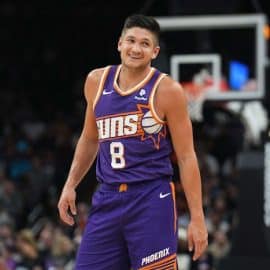Author’s Note: This is an excerpt of the NBA PowerScore that was originally published here.
Every viewer has his or her own perspective. Some people fall in love with flashy dunks, others with fancy passes, and then there are those who just love watching guys dominate a game – 2016 Russell Westbrook, Finals LeBron James, anytime Michael Jordan – you get the point. Each fan has some opinion on what makes a player great. Comparatively, every fan can watch a team and form an opinion regarding their best players. In fact, most fans could rattle off a list of who they believe are the best players on their team, ranked in order, without much hesitation. I bet you are doing it right now.
The best part? Everyone’s list is different.
All fans have their own perspective on how a good player should contribute to their team, but quite often the “eye test” can be misleading. Is a dunk really any better than a layup? They are both worth two points. Is a ferocious block sending the ball 10 rows into the stands of more value than a simple deflected shot? Probably not. Is an ankle breaking move by Kyrie Irving more important than Russell Westbrook’s pure speed blowing past a defender? No – it all depends on the end result of each play. Many fans, however, fall in love with the fancy, exciting, and clutch plays – as they should, because that is half the fun of sports. Yet, these thrilling plays do not necessarily determine a player’s value or contribution to winning the game.
That is where NBA PowerScore comes in.
Let me give a brief explanation. NBA PowerScore is a system I developed with the end goal to predict the outcome of NBA games. It does this by using advanced NBA statistics (much more than simply traditional points, rebounds, assists, etc.) to find the rating, or value, of every player in the NBA regardless of playing time. The system then takes these individual player ratings and finds a team value – dubbed a “PowerScore” – which is entered into a formula along with other factors (recent team performance, strength of schedule, etc.) to determine each team’s likelihood of winning a given game.
If that made little to no sense to you – it is perfectly okay! There are really three key points you need to know:
- NBA PowerScore correctly predicted the winner of 72.9% of NBA games in 2015-2016, and is surpassing that percentage with 81.25% so far this season. For those who may not know, these are startlingly accurate rates. I believe it can predict upwards of 75% correct for the year.
- The key to the NBA PowerScore system is the player ratings it computes. If these were not accurate, the entire system would be flawed. So, trust me, the ratings are legitimate.
- Here is a chart to help you understand the general meaning behind the PowerScore ratings:
| Player’s Value | Rating |
| Super Star | > 80 |
| Star player | 70 – 80 |
| Top 2 player on a playoff team | 50 – 70 |
| Great | 30 – 50 |
| Good | 15 – 30 |
| Starter | 5 – 15 |
| Solid | 0 – 5 |
| Should play on average team | > -20 |
So now, back to talking about player rankings. While a typical viewer’s opinion may be subject to bias of the “eye test” influenced by exciting plays or favorite players, NBA PowerScore’s ratings are strictly based on actual statistics that each player produces. There is no bias involved, and every aspect of the system is based on fact.
Is it more fun to decide who’s best based on how exciting they are to watch? Perhaps, but my guess is Thibs values fundamentals more than exciting plays. Therefore, starting today, I am going to use the system to find the value of each player on the Wolves for a given week and post it here on Howlin’ T-Wolf. That way, if you are in an argument with your friend about who had the better performance last week – Wiggins or LaVine, Rubio or Dunn, KAT or Dieng – you can check this site for the answer.
Feel free to disagree – that is half the fun of sports! But remember that these ratings are based 100% on actual statistics, so I myself believe they are the most accurate.
Follow Evan Hagen on Twitter @Hagen_Wolves and find out more about the NBA PowerScore system @NBA_PowerScore.
Add The Sports Daily to your Google News Feed!







